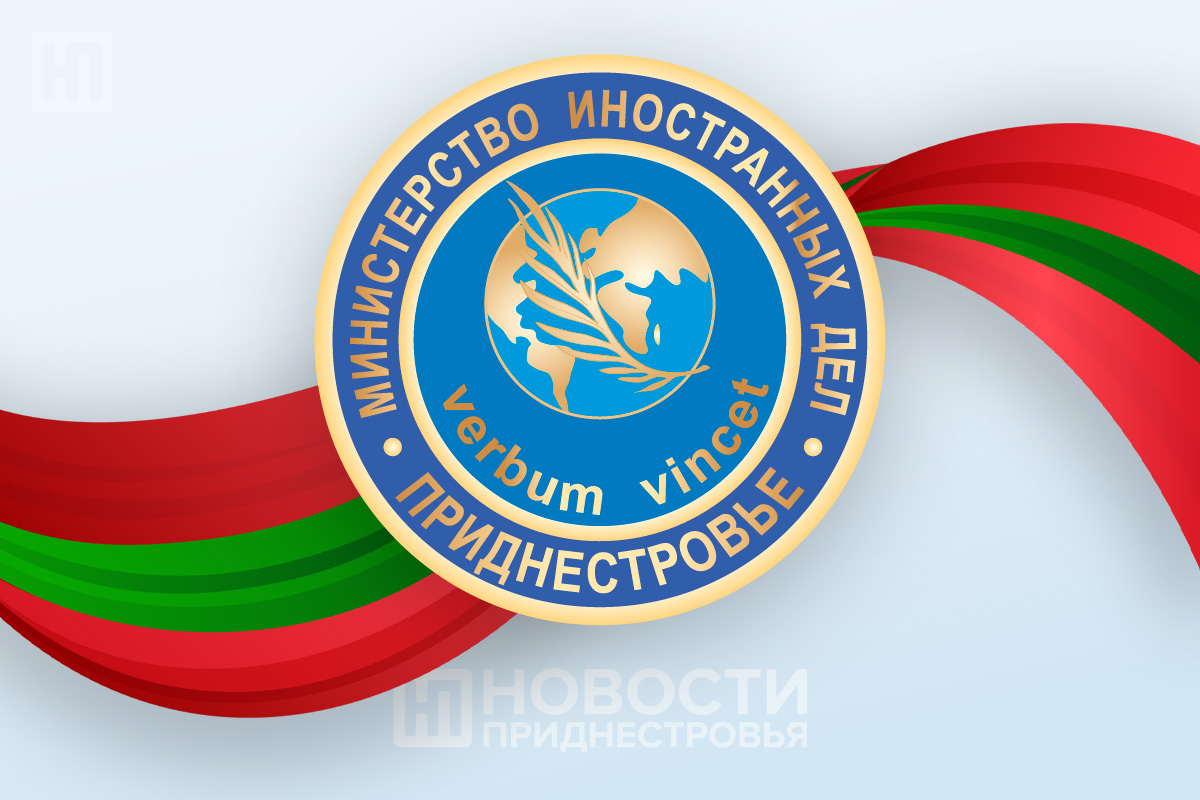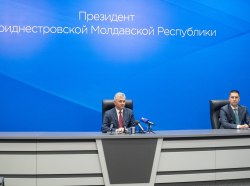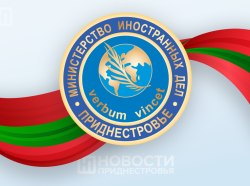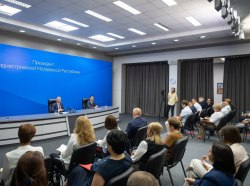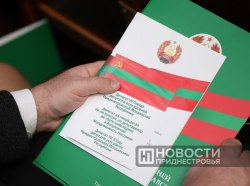Tiraspol, November 19. /Novosti Pridnestrovya/. The Ministry of Foreign Affairs shares the text of the memorandum sent to the representative for political issues from the Republic of Moldova O. Serebryan, as well as to the representatives of the mediators and observers in the negotiation process during a meeting at the OSCE Mission office in Bendery on November 19 this year.
Overview of Moldova's violations of the rights and freedoms of residents of Pridnestrovie in terms of international law
For many years, the Republic of Moldova has been implementing the practice of unjustified restrictions and discrimination against citizens and legal entities in the context of the unresolved conflict between Pridnestrovie and the Republic of Moldova. Chisinau's blocking of international negotiations in the 5+2 format - a competitive and parity dialogue instrument - after 2019, under far-fetched pretexts, objectively narrows the field for making constructive decisions. Moldova uses its conditional monopoly on international communication to justify its own repressive measures and pressure on Pridnestrovie, including through the use of disguised rhetoric about European integration and peaceful goals.
The Republic of Moldova regularly appeals to integration into the European Union, citing the EU legislation requirements for its restrictive and blockade measures. Actually, Moldova objectively violates the legal obligations it has assumed in the international environment, taking inhumane steps against citizens and organizations of the Pridnestrovian Moldavian Republic. The document presents the main, most relevant cases of violations of the rights and freedoms of residents of Pridnestrovie by the Republic of Moldova in relation to the provisions of international legal documents to which the Republic of Moldova is a party.
1. Violations of Rights in the Socio-Economic Sphere
Since January 1, 2024, the Republic of Moldova, in violation of international agreements previously reached within the negotiation process, has established an illegitimate requirement to pay customs duties on goods imported and exported by economic entities of Pridnestrovie. This destructive step has led to inflation, a decline in trade and a decrease in entrepreneurial activity, which complicates the fulfillment of the state's social obligations to citizens in Pridnestrovie.
The Republic of Moldova hereby violates the obligations assumed in 2001 during the procedure for accession to the World Trade Organization (WTO), one of the main principles of which is the creation of non-discriminatory conditions in international trade. In particular, the steps of the Republic of Moldova contradict the provisions of the Marrakesh Agreement establishing the WTO, Paragraph 2 of the Marrakesh Declaration of April 15, 1994, as well as Art. V of the General Agreement on Tariffs and Trade (GATT).
Thus, the preamble of the Marrakesh Agreement establishing the WTO states that economic and trade relations should promote higher standards of living, full employment, high and steadily growing real incomes and effective demand, and Paragraph 2 of the Marrakesh Declaration reflects a broad desire to work within the framework of a fairer and more open multilateral trading system in the interests of the well-being of all peoples.
In accordance with Art. V of the GATT, there should be freedom of transit through the territory of each state along the routes most suitable for international transit, regardless of the origin of the means of transport, its place of departure and place of destination.
As a signatory to bilateral and multilateral agreements on the elimination of double taxation, the Republic of Moldova violates its obligations in the field of trade with both individual countries and international organizations.
The restrictive actions of the Republic of Moldova are contrary to the Association Agreement between the European Union and the European Atomic Energy Community and their Member States, on the one hand, and the Republic of Moldova, on the other hand.
Within the framework of the current deep free trade area, Pridnestrovian exporters were granted the right to duty-free trade with the EU, but Moldova deprived Pridnestrovie of this right. The agreement between Pridnestrovie and the European Union on facilitating mutual trade is being violated.
Thus, Paragraph 1 of Art. 147 of the Association Agreement states that each Party must reduce or eliminate customs duties on goods originating from the other Party.
As a result of Moldova's destructive steps restricting the foreign economic activity of Pridnestrovie, the Pridnestrovian economy continues to suffer serious losses. According to the State Customs Committee of the PMR, during the first half of 2024, the republican budget received 409 million rubles in customs payments, which is 32 million (or 7%) less than in the same period of 2023.
The negative effect of the introduction of duties by the Republic of Moldova was multiplied by the ongoing banking blockade, as a result of which Pridnestrovian economic agents were deprived of the opportunity to open accounts in Moldovan banks and, as a consequence, duty-free trade through the territory of Moldova with foreign countries.
It is also about the fact that correspondent settlements of Pridnestrovian commercial banks with foreign banks are blocked, current accounts of Pridnestrovian economic agents are not serviced in Moldovan banks and new accounts are not opened. Chisinau refuses to convert Moldovan lei received by Pridnestrovie into hard currencies, and has also limited the acquiring of international credit cards in Pridnestrovie since 2019.
These actions of the Republic of Moldova contradict Art. 23 of the Universal Declaration of Human Rights, which stipulates that everyone has the right to work, to free choice of employment, to just and favourable conditions of work, as well as Art. 6 of the International Covenant on Economic, Social and Cultural Rights, which recognizes the right to work, which includes the right of everyone to the opportunity to earn a living by work that he freely chooses.
Over the past five years, there have been regular incidents with the ban or temporary blocking of the import of food products, medicines and computer equipment traveling to Pridnestrovie, with the presentation of financial and budgetary requirements. In particular, since 2024, the said cases are motivated by the so-called "extended producer responsibility", which implies payments in favor of specialized associations of Moldova for, allegedly, the costs of subsequent disposal of the packaging of imported products. The introduction of such requirements is nonsense, since the relevant disposal work is carried out on the territory of the PMR. In this context, the fundamental principle of the environmental policy of the European Union is relevant - "the polluter pays", enshrined in Directive of the European Parliament and of the Council 94/62/EC of 20 December 1994 on packaging and packaging waste. Moreover, the said directive states that packaging and packaging waste management systems should be designed in such a way as to avoid discrimination against imported products, distortion of competition and barriers to trade.
An extremely acute problem is the blocking by Moldova of the export of products from the Pridnestrovian industrial enterprises Moldavizolit, Potencial and Elektromash, which the RM classifies as "dual-use" goods on far-fetched grounds. As a result of targeted restrictive measures with a political subtext, these enterprises were forced to go into idle mode, which harmed workers, their families and the economy as a whole. In total, about one and a half thousand people were left without a livelihood.
The blocking of the RM of exports and, as a consequence, the normal operation of the Pridnestrovian industrial enterprises is carried out in violation of Art. 23 of the Universal Declaration of Human Rights and Art. 6 of the International Covenant on Economic, Social and Cultural Rights, as well as the obligations of all parties under the document "Facilitation of Trade with the EU - Implementation of Measures".
The restrictive measures by the RM also concern the work of one of the key budget-forming enterprises of Pridnestrovie - the Moldovan Metallurgical Plant (MMP). In particular, the Moldovan authorities are taking steps to deliberalize the scrap metal market, prohibiting the Pridnestrovian enterprise from purchasing raw materials in the Republic of Moldova and other countries at competitive prices and requiring all scrap metal deliveries to be made exclusively through the intermediary firm Metalferos with a monopoly position. The above-mentioned monopolistic actions of the Republic of Moldova are arbitrary and absolutely inconsistent with European practices, in particular, Art. 3 of the Treaty establishing the European Community, which guarantees that competition in the EU internal market is not violated, and Art. 102 of the Treaty on the Functioning of the European Union, which prohibits companies from abusing their dominant position.
2. Violations in the Sphere of Personal Security and Freedom of Movement
In February 2023, amendments were made to the criminal legislation in Moldova, which put every resident of Pridnestrovie at risk of prosecution.
In particular, the Criminal Code of the Republic of Moldova was supplemented with new provisions concerning such concepts as "anti-constitutional subject", "illegal information structure", "creation of an illegal information structure" (the offense is punishable by imprisonment for a term of 7 to 10 years), "conspiracy against the Republic of Moldova" (from 2 to 7 years), "illegal collection of information" (from 2 to 5 years), "separatism" (from 2 to 6 years), etc.
Obviously, by "anti-constitutional subject" the Moldovan authorities mean the Pridnestrovian state authorities, and by "illegal information structure" - the security agencies of Pridnestrovie. Moreover, the Information and Security Service of Moldova (the initiator of the amendments) publicly acknowledged that the draft law is aimed against “quasi-institutions of power, such as the Government and Parliament” of Pridnestrovie.
De facto, Chisinau has created a legal basis and expanded the tools for criminal prosecution and intimidation of the population of Pridnestrovie. Articles providing for criminal liability for separatism may affect both officials and organizations and citizens of the PMR.
The amendments criminalizing “separatism” received a negative assessment from representatives of the international community. The OSCE Office for Democratic Institutions and Human Rights (ODIHR) in its commentary on the Moldovan amendments noted their vague nature, as well as the possibility of arbitrary application, which could limit freedom of speech.
Actually, the ODIHR document follows the logic that the desire for separation and independent existence is legal as long as it does not cross the line of violence. In the case of Pridnestrovie, which has been conducting the negotiation process for over 30 years and declares its commitment to exclusively peaceful, diplomatic methods in the settlement, there can be no talk of "crossing the line of violence".
In the context of considering the universal norms of international law, it should be noted that the above-mentioned amendments to the Criminal Code of the Republic of Moldova directly contradict the Declaration on Principles of International Law, the spirit of the Universal Declaration of Human Rights and the Charter of the United Nations.
The adoption of the so-called "law on separatism" in Moldova has negatively affected the course of the negotiation process. In fact, rounds of negotiations at all levels on the territory of the Republic of Moldova were blocked. Pridnestrovian officials officially participating in the dialogue found themselves under the threat of sanctions and criminal prosecution - during a visit to Chisinau to participate in a meeting of representatives on political issues or expert (working) groups, the Pridnestrovian delegation simply risks being arrested. In this regard, the Republic of Moldova violates the agreements reached with the mediation of the OSCE: The Principles and Procedures for Conducting Negotiations within the Negotiation Process, the General Rules of the Expert (Working) Groups on Confidence-Building Measures and Development of Interaction, as well as the 2019 “gentleman’s agreement” concluded under the guarantees of the Head of the OSCE Mission.
In addition, in June 2024, legislative amendments were made to the so-called “high treason” in the Republic of Moldova, which expand the danger of the previously mentioned amendments to the Criminal Code and can further aggravate the situation in the negotiation process.
In violation of the provisions of the Protocol Decision on Certain Aspects of Freedom of Movement of the Population of 2014 and the “gentleman’s agreement” of 2019, Moldova continues to implement pressure measures on the citizens of Pridnestrovie related to delays, in-depth checks on the so-called “second line” and interrogations during border control at the Chisinau International Airport. Moreover, there have already been cases where Pridnestrovian citizens were deported on completely far-fetched grounds.
Thus, on December 19, 2023, a citizen of Pridnestrovie, Alexander Navarich, who was returning with his family from abroad, was stopped at the Chisinau airport and, under a formal pretext, was not allowed into Moldova. As a result, A. Navarich was separated from his closest relatives and was forced to wander for a long time, waiting for the opportunity to return home.
A similar incident occurred on January 22, 2024, when the law enforcement agencies of the Republic of Moldova deported a citizen of the PMR, the chairperson of the Tiraspol City Court, Anna Mamei, who was returning home to Pridnestrovie.
These openly inhumane actions of Moldova were committed in violation of Paragraph 1 of Art. 13 of the Universal Declaration of Human Rights: everyone has the right to freedom of movement and choice of residence, as well as Art. 9 of the Convention on the Rights of the Child: States Parties shall ensure that the child is not separated from his or her parents against their will. Due to the unconstructive behavior of the Republic of Moldova, Pridnestrovian drivers are deprived of the opportunity to fully participate in international road traffic. One of the reasons is that the Moldovan authorities have sent appeals to foreign countries calling on them not to recognize Pridnestrovian driver's documents, registration certificates and license plates as valid. Moreover, since September 2018, the Republic of Moldova has begun to refuse all holders of driver's licenses issued in Pridnestrovie to travel abroad.
It is worth noting that driver's licenses issued by the state authorities of the PMR fully comply with the standards set out in the Vienna Convention on Road Traffic of 1968, and their model was agreed upon with the Moldovan side.
These actions of the Republic of Moldova are contrary to Art. 41 of the aforementioned Convention, which states that the contracting parties will recognize any international driver's license that complies with the requirements of this Convention as valid on their territory. At the same time, the Moldovan authorities announced plans to introduce a ban on the movement of cars with Pridnestrovian registration plates on the country's roads. This issue remains open, and the estimated date for the entry into force of additional restrictions is 2026. The stated intentions of the Republic of Moldova are capable of further infringing on the freedom of movement of Pridnestrovians, guaranteed by the Vienna Convention on Road Traffic and the Universal Declaration of Human Rights.
3. Provoking Problems of a General Legal and Humanitarian Nature
Since 2022, the Republic of Moldova, taking advantage of the situation when the border of Pridnestrovie with Ukraine is closed and the only way to the PMR is transit through the territory of Moldova, creates artificial barriers to the import of food products, medicines and veterinary drugs, plant protection products and equipment to Pridnestrovie.
The supply of medicines not included in the Moldovan register of medicines was stopped, and the work on reconciling and supplementing the registers of vital drugs in Pridnestrovie and the Republic of Moldova, which had been carried out since 2018, was completely stopped at the initiative of the Moldovan side.
With the introduction of unjustified customs duties by the Republic of Moldova, the import of medical products through intermediaries became only possible upon payment of fees. This circumstance significantly reduced the possibility of finding the most optimal price offer on foreign markets. In the case of purchasing medicines in Moldova, the markup on the drug for the end consumer is 15% or more, which reduces the availability of medicines for socially vulnerable groups of the population.
Today, Pridnestrovie is forced to import virtually all medicines from the Republic of Moldova and the European Union, which, taking into account customs duties, VAT, their market price and other markups, leads to a significant increase in the cost of medicines (on average by 80% over two years). At the same time, a number of traditional drugs for Pridnestrovians produced by pharmaceutical companies outside the European Union fell out of sale.
A similar situation has developed with the import of medical equipment to Pridnestrovie. Starting in 2022, equipment and components can only be imported through the Republic of Moldova. This led to a six-month downtime of the CT scanner at the Republican Neurological Hospital in 2023, the impossibility of timely updating the equipment in the X-ray room at the tuberculosis department of the Republican Clinical Hospital - repair work had to be postponed for almost the entire 2024, as well as interruptions in diagnostics in the X-ray departments of a number of hospitals.
By blocking medical supplies to Pridnestrovie, Moldova neglects the principles of the World Health Organization: recognition of the highest attainable standard of health as one of the fundamental rights of every person without distinction as to race, religion, political belief, economic or social status, recognition of the health of all peoples as the main factor in achieving peace and security, as well as the need to provide all peoples with the opportunity to enjoy all the achievements of medicine.
In addition, the actions of the Republic of Moldova contradict Paragraph 1 of Art. 25 of the Universal Declaration of Human Rights, which enshrines the right of everyone to a standard of living, including medical care, necessary for the maintenance of the health and well-being of himself and his family, Art. 12 of the International Covenant on Economic, Social and Cultural Rights, which enshrines the right of everyone to the highest attainable standard of physical and mental health, as well as Art. 25 of the Convention on the Rights of Persons with Disabilities, according to which persons with disabilities have the right to the highest attainable standard of health.
The Republic of Moldova is creating the basis for a new "telephone war" with Pridnestrovie. During the first round of electronic confrontation in 2003, the authorities of the Republic of Moldova decided to transfer to their television operators for broadcasting those frequencies on which Pridnestrovian mobile communications operated. As a result, mutual signal jamming began.
The conditions for a repeat of the situation matured by 2016-2017, when both sides switched to VoLTE technology. There was a danger that interference would arise, due to which subscribers would not be able to use high-quality mobile communications. To prevent such a risk, the parties signed the Protocol Decision “On measures to organize interaction in the field of telecommunications and electronic communications”, the basis of which was the territorial delimitation of the use of radio frequencies and inter-operator roaming.
However, at the end of November 2022, Chisinau refused to extend the said Protocol Decision. In conditions when operators from both Moldova and Pridnestrovie are preparing to switch to the 5G standard and also operate in the same LTE-800 frequency block, the risk of mutual interference arises again.
Thus, Moldova's actions tend to go beyond Art. 45 of the Constitution of the International Telecommunication Union, which states that all stations, whatever their purpose, must be established and operated in such a way as not to cause harmful interference to radio communications or radio services of other Member States or recognized operating agencies and other duly authorized operating agencies that provide radio services and act in accordance with the provisions of the Radio Regulations.
The Republic of Moldova hinders the free choice of citizenship and imposes the citizenship of the Republic of Moldova on the residents of Pridnestrovie. Such behavior is explained by the fact that, according to the Moldovan authorities, all citizens born and residing in Pridnestrovie are by default citizens of the Republic of Moldova.
The Moldovan side justifies its position by the need to fulfill the international obligations that Moldova assumed by joining the UN Convention relating to the Status of Stateless Persons of 1954 and the UN Convention on the Reduction of Statelessness of 1961. Referring to these documents, Chisinau decided to automatically grant citizenship of the Republic of Moldova to all persons who have the right to Moldovan citizenship in accordance with the Law "On Citizenship of the Republic of Moldova".
In this regard, it is necessary to pay attention to a number of violations and deliberate omissions made by the Moldovan side in interpreting international legislation. In particular, none of the above-mentioned Conventions oblige actual stateless persons to acquire the citizenship of the state in which territory they currently reside de jure, but only grant them the right to demand citizenship in the country of residence. The inclusion of all residents of Pridnestrovie in the citizenship of the Republic of Moldova, brought to the point of automatism, effectively deprives them of the right to freely enter into the citizenship of one or another state with which they identify themselves, primarily on cultural and linguistic grounds.
Moreover, Art. 15 of the Universal Declaration of Human Rights of 1948 establishes the principle that everyone has the right to a nationality, no one can be arbitrarily deprived of his nationality or the right to change his nationality. Therefore, a person is not obliged to obtain citizenship, but only has the right to do so, the obligation in this case arises for the state and is a guarantee of human rights.
Thus, a paradoxical situation arises when the Republic of Moldova hinders the free choice of citizenship of other states and imposes on the citizens of Pridnestrovie absolutely uncontested forms that deprive them of the legal right to freely choose citizenship in the context of the unresolved conflict between Pridnestrovie and the Republic of Moldova, as well as the existing consequences associated with the collapse of the USSR.
The Republic of Moldova applies discriminatory measures against Russian citizens living in Pridnestrovie (more than 220 thousand). Thus, in March 2024, the Republic of Moldova officially refused to open polling stations for the presidential elections of the Russian Federation in the PMR. This step, aimed at depriving Pridnestrovian Russians of their right to vote, can be qualified as a violation of Art. 25 of the Vienna Convention on Diplomatic Relations - the receiving state must provide all facilities for the performance of the functions of representation, as well as the Vienna Convention on Consular Relations, Art. 35 of which states that the receiving state must permit and protect freedom of communication of the consular office for all official purposes.
Moreover, regular expulsions of Russian diplomats and the reduction of the number of the diplomatic corps of the Russian Federation in Chisinau leads to a decrease in the speed and quality of consular services provided, as a result of which numerous queues are formed, citizens are forced to wait a long time for an appointment.
The Republic of Moldova discriminated against Pridnestrovians holding Moldovan citizenship during the elections and plebiscite in 2024. Pridnestrovie`s call to take into account the opinion of the population in the context of the referendum on October 20 was ignored. Discriminatory measures against Pridnestrovians were most noticeable in the second round of the presidential elections in the Republic of Moldova on November 3. The Moldovan authorities, for far-fetched and often absurd reasons, blocked border checkpoints in order to physically prevent Pridnestrovians from reaching the polling stations. Thus, Moldovan security forces repeatedly stopped traffic on the Rybnitsa-Rezina bridge due to the alleged “detention of a suspicious person,” the threat of “mining,” and road repairs. “Reports of mining” were also received regarding the building in Varnitsa, where three polling stations for residents of Bendery were located. At some checkpoints, Pridnestrovians were denied entry to the Republic of Moldova, calling them an “organized group.” Moreover, there were cases when cars with Pridnestrovian registration were turned away due to the headlights being turned off and cracks in the glass.
The above actions by the Republic of Moldova not only limited the freedom of movement of citizens guaranteed by Art. 13 of the Universal Declaration of Human Rights, but also violated Art. 5 of the European Convention on Nationality, which states that each participating State shall be guided by the principle of non-discrimination between its citizens, whether citizens by birth or by persons who have subsequently acquired their nationality, as well as the OSCE commitments in the field of elections (Document of the Copenhagen Meeting of 1990): participating States shall ensure that voting is by secret ballot or by equivalent free voting procedure, that the votes are counted and reported honestly and that the official results are made public.
4. Creation of Risks and Threats in the Sphere of Regional Security
The Republic of Moldova, contrary to the principle of neutrality enshrined in the constitution, systematically participates in military exercises and rapidly carries out militarization. At the same time, the constitutionally enshrined neutrality of the Republic of Moldova and the possible risks of escalation of regional tensions are largely ignored.
In the absence of a direct military threat, which is also recognized by the Moldovan leadership, the actions of the Republic of Moldova act as a destabilizing factor, having a negative impact on the situation in the Security Zone (SZ). Often, exercises conducted by military units of Moldova also affect the territory of the SZ, which is a violation of the governing documents and principles of the peacekeeping operation on the Dniester.
Moldova acts as a host country for such large-scale exercises with the USA and Romania as Swift Response-2024, Peace Shield-2024, JCET-2024, Fire Shield-2024 (the total number of military events of the Republic of Moldova with foreign participation for the period January-November 2024 is more than 20).
There is a tendency to integrate the army of the Republic of Moldova into the military command system of Romania. In July 2024, the Moldovan Parliament ratified amendments to the agreement on military cooperation with Romania, which provide for Bucharest's assistance in various missions and operations (including under the auspices of the EU and NATO), allowing the inclusion of Moldovan military personnel in the Romanian contingent. Moreover, the Government of Moldova has approved a national defense strategy, which emphasizes that the Russian military contingent in Pridnestrovie and Pridnestrovian military formations pose a threat to the national security of the Republic of Moldova. Along with this, it is planned to increase defense spending and integrate Moldova into the EU military structures.
These actions are actually being taken to the detriment of the security of Pridnestrovie and the regional security system. In the context of the OSCE Mission operating in the Republic of Moldova, it is worth noting the violation of the documents of the said organization by Moldova.
Thus, the militarization of the Republic of Moldova is carried out in violation of the OSCE Code of Conduct on the Military-Political Aspects of Security. Point 3 of the Code states that security is indivisible and the security of each state is inextricably linked with the security of all other participating states. They (the participating states) will not strengthen their security at the expense of the security of other states. In addition, point 12 of the Code is relevant in the context of the absence of a military threat to the Republic of Moldova: each participating state will only maintain such military potential that is commensurate with its legitimate individual or collective security needs.

